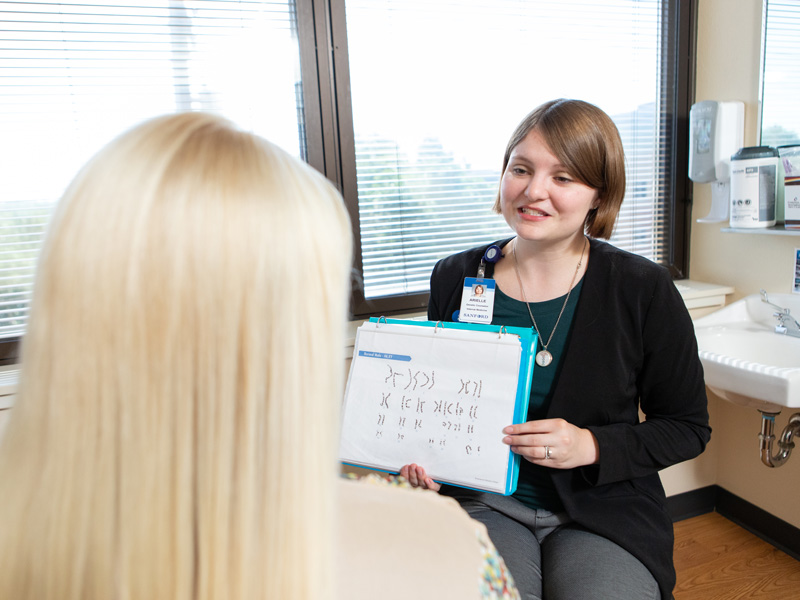Larissa Risty wants to know everything about you.
The genetic counselor at Sanford Health finds herself sitting across a desk from people every day, asking them about their family history, their own history and what it would mean to them if they found out what they’re made of – when it comes to their genes.
It’s a weighty question that everyone answers differently.
Genetic counselors work with physicians and other providers throughout the Sanford Health system to help people better understand the likelihood they will or won’t develop certain diseases, such as breast cancer. It’s a field that continues to evolve, with more information available every year.
“We get referrals from all over,” Risty says. “They’re looking for those clues, multiple affected family members or people with a young onset of cancer.”
Connecting the dots
Speaking with genetic counselors can seem daunting – and easily misunderstood. The actual testing of a tumor is done by an oncologist, and that determines your treatment. What Risty and others on her team do is help people connect the dots in their own lives, their family history and then determine what that means.
“Some people think the genetic testing is going to help them with their treatment plan,” Risty says. “It’s not to decide if chemotherapy will be used – it’s more for your future, to determine if there are other cancers you may be at increased risk for.”
Once people have a few more details, it can inform all their decisions – such as choosing a mastectomy over a lumpectomy if they have breast cancer and discover they are at increased risk. Other times, they may choose to not find out more information.
It’s a personal decision, says Lior Borovik, a genetic counselor.
“Sometimes people think it’s not the right thing for them, or it’s not the right time, like if they’re already going through treatment and the results won’t change anything,” he says.
More information, more testing
Other times, someone may have had counseling and testing in the past but they come back to discuss their history because there’s more information about the genetics of breast cancer. Then, additional testing options might be available.
“Five years ago, we would have only done BRCA1/2 (breast cancer gene) testing,” Risty says. “We didn’t have bigger panels. Now, we do. If a woman pursues testing, we can test more genes.”
For example, the computer models that help assess risk are only as good as the information in them. With additional information about the cancer diagnosis or genetic testing that has been done in the family, the assessed risk can change. Each answer is based on that moment in time.
The same is true for other cancers, too, she said.
Then once the results are in, Risty and others recommend sharing them with family members.
“Genetics means family,” Risty says. “Once a family member is known to have a hereditary cancer risk, there are other family members at risk to carry the same trait.”
Parental guilt
For people who aren’t comfortable having the conversation, genetic counselors can help draft a letter to family members explaining the meaning and implication of the results.
“We have a lot of women cancer patients who want this information for their kids,” Risty says. “Moms feel innately guilty about anything they passed on to their children. This can help them understand.”
That’s a huge part of the job – helping people address any emotions they have with any results they receive. Even a positive result can give someone closure, Borovik says.
“Sometimes it causes anxiety and stress, and we talk about that,” he says. “Some people might be disappointed even with a negative result because they still don’t have an answer.”
But what matters is determining how much information you want to know, what you’ll do with the knowledge and how to find it.
“You don’t have to have cancer to see us,” Risty says. “We want to answer any questions you have.”
Do I need genetic testing?
Genetic testing looks at your family history and DNA to determine your risk for cancer. For breast cancer, the average risk is about 12 percent. Genetic and lifestyle factors can influence that.
Here’s when to consider the testing:
- A breast cancer diagnosis in someone younger than 45
- Multi-generational breast cancer diagnoses
- Post-menopausal breast cancer diagnoses in three or more women in one family
- Hereditary cancer diagnosis
Source: Sanford Health
Find genetic counselors near you or to make an appointment.
…
Posted In Cancer, Genetics, Health Information, Women's
